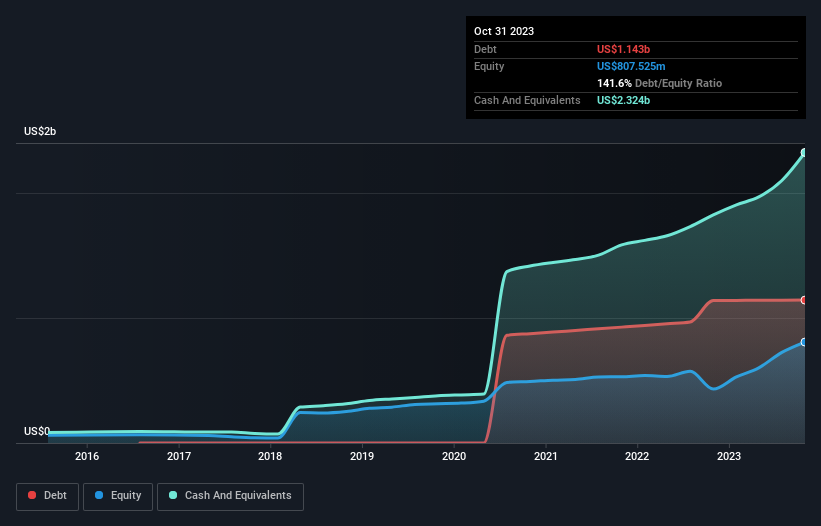Is Zscaler (NASDAQ:ZS) Using Too Much Debt?
Howard Marks put it nicely when he said that, rather than worrying about share price volatility, 'The possibility of permanent loss is the risk I worry about... and every practical investor I know worries about.' So it might be obvious that you need to consider debt, when you think about how risky any given stock is, because too much debt can sink a company. As with many other companies Zscaler, Inc. (NASDAQ:ZS) makes use of debt. But is this debt a concern to shareholders?
When Is Debt Dangerous?
Generally speaking, debt only becomes a real problem when a company can't easily pay it off, either by raising capital or with its own cash flow. If things get really bad, the lenders can take control of the business. However, a more frequent (but still costly) occurrence is where a company must issue shares at bargain-basement prices, permanently diluting shareholders, just to shore up its balance sheet. Of course, debt can be an important tool in businesses, particularly capital heavy businesses. The first step when considering a company's debt levels is to consider its cash and debt together.
View our latest analysis for Zscaler
What Is Zscaler's Debt?
The chart below, which you can click on for greater detail, shows that Zscaler had US$1.14b in debt in October 2023; about the same as the year before. But it also has US$2.32b in cash to offset that, meaning it has US$1.18b net cash.
How Strong Is Zscaler's Balance Sheet?
Zooming in on the latest balance sheet data, we can see that Zscaler had liabilities of US$1.47b due within 12 months and liabilities of US$1.35b due beyond that. On the other hand, it had cash of US$2.32b and US$376.3m worth of receivables due within a year. So it has liabilities totalling US$127.3m more than its cash and near-term receivables, combined.
This state of affairs indicates that Zscaler's balance sheet looks quite solid, as its total liabilities are just about equal to its liquid assets. So it's very unlikely that the US$35.2b company is short on cash, but still worth keeping an eye on the balance sheet. While it does have liabilities worth noting, Zscaler also has more cash than debt, so we're pretty confident it can manage its debt safely. There's no doubt that we learn most about debt from the balance sheet. But ultimately the future profitability of the business will decide if Zscaler can strengthen its balance sheet over time. So if you want to see what the professionals think, you might find this free report on analyst profit forecasts to be interesting.
Over 12 months, Zscaler reported revenue of US$1.8b, which is a gain of 45%, although it did not report any earnings before interest and tax. Shareholders probably have their fingers crossed that it can grow its way to profits.
So How Risky Is Zscaler?
While Zscaler lost money on an earnings before interest and tax (EBIT) level, it actually generated positive free cash flow US$463m. So although it is loss-making, it doesn't seem to have too much near-term balance sheet risk, keeping in mind the net cash. One positive is that Zscaler is growing revenue apace, which makes it easier to sell a growth story and raise capital if need be. But we still think it's somewhat risky. There's no doubt that we learn most about debt from the balance sheet. But ultimately, every company can contain risks that exist outside of the balance sheet. For example - Zscaler has 3 warning signs we think you should be aware of.
Of course, if you're the type of investor who prefers buying stocks without the burden of debt, then don't hesitate to discover our exclusive list of net cash growth stocks, today.
Have feedback on this article? Concerned about the content? Get in touch with us directly. Alternatively, email editorial-team (at) simplywallst.com.
This article by Simply Wall St is general in nature. We provide commentary based on historical data and analyst forecasts only using an unbiased methodology and our articles are not intended to be financial advice. It does not constitute a recommendation to buy or sell any stock, and does not take account of your objectives, or your financial situation. We aim to bring you long-term focused analysis driven by fundamental data. Note that our analysis may not factor in the latest price-sensitive company announcements or qualitative material. Simply Wall St has no position in any stocks mentioned.

 Yahoo Finance
Yahoo Finance 
